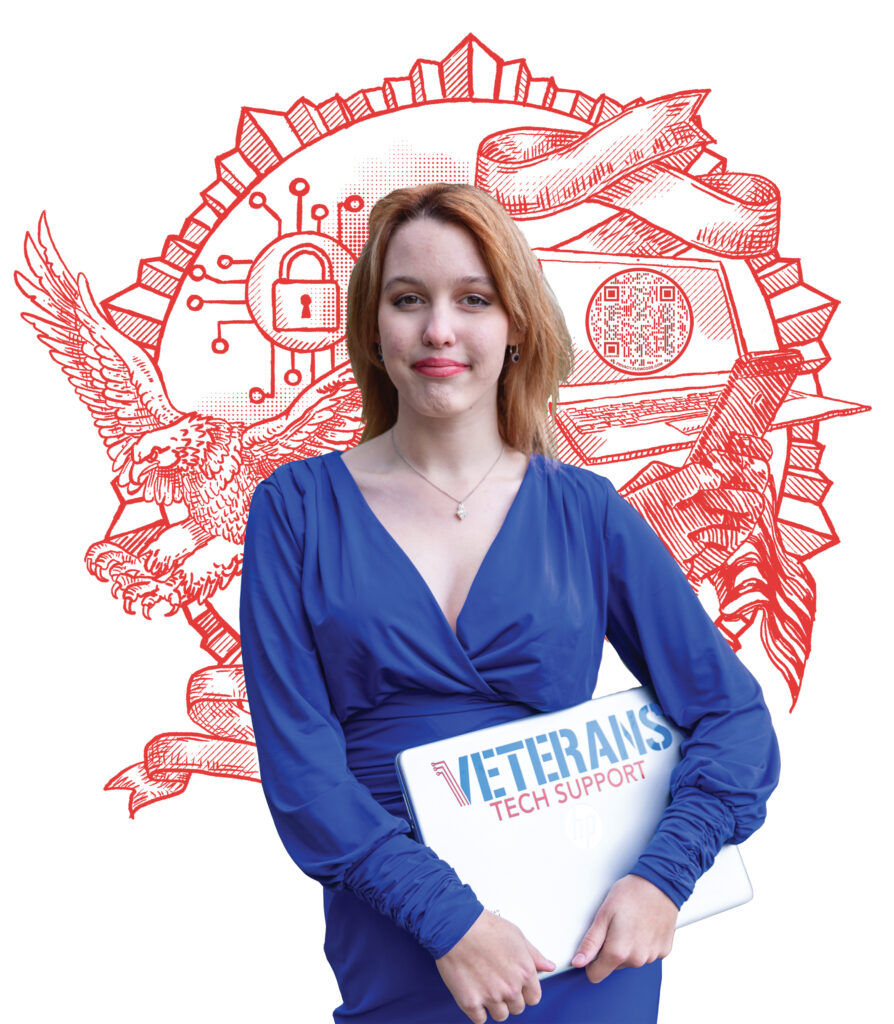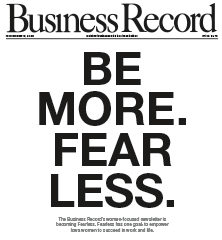
As told to Nicole Grundmeier
Abigail Johnson is the founder and CEO of Veterans Tech Support, which offers classes in technology basics to military veterans in eastern Iowa. Johnson started the nonprofit in 2021, when she was 14 years old. Technology has been a part of her life since she was a small child, playing video games while sitting on a parent’s lap. Veterans have also always been a part of Johnson’s life – her grandfather lost his leg during the Vietnam War. Two years ago, Johnson saw a need to help older veterans gain computer skills and realized that she could do something about it. A grant helped get Veterans Tech Support off the ground, and now classes are offered regularly in the Scott County area. Johnson was born in Davenport and lives in Blue Grass, Iowa, just west of the Quad Cities. Now 16, Johnson has plans for Veterans Tech Support to grow, and she’s looking ahead toward the next moves in her own education and professional careers. She is a junior at North High School in Davenport and also takes classes at Eastern Iowa Community Colleges.
The following story has been formatted to be entirely in her words, and has been edited and condensed for clarity.
I’ve sort of always had technology around me, whether it was just playing video games with my parents or watching TV. Some of my earliest memories of hanging out with my parents are playing video games on their computer on their laps, or watching my parents do whatever they were doing on the computer.
I was 5 when I got my first computer because I kept stealing theirs for games. Really, I bonded a lot of the time with my parents when we would play video games together, and it would be great. They gave me a lot of what I thought at the time were just fun games, but then later learned were coding classes that they would show me and have me play. I’ve always been learning, even if I thought I was playing.
I really liked the social aspect of being able to do that and then show my parents, “Look! I did this in this game!” I really liked the amusement of it too. It felt like I was able to do something fun on my own without having to always have my parents’ assistance. So it gave me a little bit of independence, but it was mostly just me loving playing video games.
I was given less restricted internet access as a child because my parents trusted me. They knew that I wouldn’t do dumb things. We were always in the same room together whenever I was playing on my computers and stuff, but that’s just because we had a big shared office. It was also the living room. I love my parents. They’re the absolute best. I wouldn’t be anywhere at all without them, without the resources they’ve given me – not only with giving me things that I thought were fun video games, but were actually coding exercises – but also they signed me up for plenty of outside technology classes, like 212 STEAM Labs.
——————
My grandfather is a 100% disabled, combat-wounded Vietnam veteran. He lost his leg in Vietnam. That happened around 1968. I have my grandpa, I have other family members that have been in the military and are in the military. He volunteered to be in the war after he got out of high school.
My grandpa’s always been great. He’s a really, really sweet person, and his outlook on life was always that every day is a gift. He was always like, “I should be dead. The land mine should have taken all of me and not just my leg,” so he treated every single day as a gift. He had a really nice outlook on life, which had a positive influence on me.
I always had a really positive relationship with him, which helped me have a positive influence on veterans. Not only because of him, but because about half the members of our local American Legion were at my mom’s baby shower for me. I’ve always been surrounded with military veterans.
My grandpa had a flip phone for many, many, many years. Whenever he needed help getting to online banking and such, he would always go to my mother. And he still does; we’re working on that part.
I won the Iowa Technology & Education Connection fair in fifth and sixth grade, purple ribbons all the way. After that, the members of my local American Legion started to ask me different questions about technology and asking for assistance with phones, like, “How do I get this picture off of my phone and into a physical picture?” It helped me realize that, “Oh, hey, I actually know a lot about technology. How can I help these people that apparently don’t?”
——————
My grandma entered me into a $10,000 grant that she saw on the “Kelly Clarkson Show.” It was the Pilot Pen STEM grant. I think that the year that I won, which was 2022, was the last year that they offered it. But she saw it on the “Kelly Clarkson Show.” It was also called the Overachievers Grant, and she said, “OK, I’m entering my granddaughter in this.”
So she ended up entering me in that grant, and I ended up winning it. Of that, $7,500 went to me and the rest went to my school district. The grant was for my own “STEM education,” which is a really vague wording. There’s a bunch of different things that you could use it for. I ended up using some of it to go to DEF CON, a cybersecurity hacking convention in Las Vegas. I ended up learning a lot.
I spent the rest of it on Veterans Tech Support, starting our first location, buying five laptops, a secure laptop cart, printer, paper, projector, all of that. The rest was on things like website domain fees and then the little fees that you have to have to start an official nonprofit.
I really thought of Veterans Tech Support when I learned that I had won the money and I was like, “How am I supposed to use this? What should I do?” Then I looked back and I was like, “Wait, it says ‘STEM education.’ But does that have to mean my STEM education? Or can I use it to help others?” Because I’d already been helping the Legionnaires and such with technology, and my grandpa. So I presented the idea to my Legion and I got a really positive response. They all seemed excited about it. So I ended up making it an official thing.
It’s been absolutely amazing. Almost every time I talk to someone about how they feel about classes and if it’s helped them, they’re always like, “This has helped me so much, and I’ve actually learned things. I know more now. I love this.” They’re thanking me, and it makes me feel really good, because this is the entire point of this, to help people. And so long as I’m helping people, I’m happy.
If I help one person and all the entire rest of Veterans Tech Support ended up failing, I’d still be happy, because I helped someone. But it seems like a lot of the veterans are excited about the classes and excited to learn more. And it can be a little bit hard to get people into that first class, because they can be really stubborn, both with the generations and the veterans part of that. But sometimes they just need a little push to come to the first class and then they’ll start learning and they’ll be like, “I guess this is good. I guess I do like this. I guess I do need it.”
——————
Our first class in Veterans Tech Support is how to turn on a computer and get signed in and basic settings like how to change the brightness and the volume, things like how to actually start to be on it. A lot of those veterans are lacking that knowledge. Really quick, fun fact: The average age of both an American Legion member and a Veterans of Foreign Wars post member is 67, and a lot of the people that start to come to our classes are in their 70s. A lot of them were in the workforce and used technology. But with their computers, they didn’t really have to do much. They only had one or two programs that they strictly used, and that is all they know. So a lot of them are missing those basic technology skills that you would assume, “Oh, you open a computer, you just go blah, blah, you do it.” And then boom. That’s it. But you don’t realize that they missed a lot of that because they thought, “Oh, I’m using it for this one thing. I don’t need to learn anything else. It’s fine.” But you really did have to learn all those other things. Also, phones really are a huge lesson that everybody loves to have.
A lot of them have said that, after being in class, they’ve been able to explore more and actually use technology. I think the most excited that I’ve seen them get is when I showed them how to scan a QR code – you know the Hy-Vee bags? The “H” on it, it’s actually a QR code, and when you scan it, it pops up all of the coupons and daily deals and such. They got really excited about that.
Just generally improving their daily lives and things that you usually do day-to-day and helping them speed that up – it’s things that have really improved their lives. A lot of them have been like, “Hey, I can actually use my phone now,” which is always good.
Something else that improves their daily lives that I feel like they don’t think about as much but I do is, we also teach basic cybersecurity to keep them safe online, because they’re such a targeted population for scammers because of their usual lack of technology knowledge. Being able to teach them about cybersecurity and teaching them how to recognize a scam, how to stay safe from it, and how to avoid identity theft.

——————
I want to go into technology, whether it’s cybersecurity … basically, I want to go into the computers field. Not exactly sure what part of it yet, though.
A lot of people are just really impressed. I can’t count the amount of times that I’ve been told, “Wow, it’s so amazing you’re doing this, and at such a young age!” Sometimes I feel like that’s all people really see. But also it just makes them more impressed with me, which can be a good thing as well.
I ended up getting selected to have the Governor’s Volunteer Service Award, and I got to go to a fancy ceremony where everybody got to go up and get their award and say hi to Gov. Kim Reynolds.
My hope for the future of Veterans Tech Support is being able to spread this nationwide. Obviously, veterans struggling with technology is not a centralized problem. It’s everywhere. I have plenty of places interested, whether they’re in Iowa, Illinois, Georgia – Georgia is interested! I went to the American Legion National Convention in North Carolina because I won the American Legion Auxiliary National Junior Member of the Year, and I ended up being able to talk about Veterans Tech Support myself in front of 1,500 people, which is slightly terrifying.
My goal is to be able to get more money to get more locations to help as many people as possible. Also, eventually to pay myself, but that’s a completely separate deal. Before I’m able to pay myself, I’m going to make sure that every location that wants one has one.
I have lots of wonderful volunteers that teach classes. We’re volunteer-led. I usually try to get an adult and a teenager-type-aged person. Because I’ve also learned that the veterans seem to trust a teenager with technology because they’re like, “Oh, they probably know what works.”
I’ve experienced a lot of being one of the very few women in the room. But a lot of the time, people seem to be not as focused on my gender and more of being, “Wow, that’s a 16-year-old doing this.” It’s good to have more of the age factor to surprise them than the gender factor to surprise them.
I have noticed that females definitely have less of a presence in the technology world, but I’m lucky to have met a bunch of different wonderful female technology people. For example, my self-proclaimed and also me-proclaimed cyber mom, Kate Kuehn. She is a wonderful technology professional, and she is my mentor. She’s absolutely amazing at what she does, and a very inspiring female in the field. She’s my hero, and I’m very happy to know her.
——————
I was terrified that things wouldn’t go right. I was terrified that they wouldn’t take me seriously, because I was at the time 14, 15, and I learned that it doesn’t matter that I’m scared. I will still push myself through it, and hopefully it’ll work out. That’s the best I can hope for.
For people who are my age, and they’re scared to do things like this: It doesn’t matter what others think, and what others expect of you. You can just do whatever you put your mind to. I know that’s such a cheesy quote, but it’s true.
I definitely didn’t think I was going to win a $10,000 grant and then eventually win another $10,000 grant. I didn’t think that I would be able to start a nonprofit, but honestly I’ve had so much support – and take support where it’s offered. Help is so important. And it’s way more important than anyone’s pride.
Stay strong to who you are, and you shouldn’t care what everyone thinks. You should care what you think, and what you want, and what you would like to do with your life.
What does it mean to be fearless?
Being fearless is being able to do all of these things that I’m doing and not crumbling under the pressure. Being fearless is the ability to have fear and still go through with it – because I am terrified all the time that I’m not doing the right thing, but I still do it.
For me, helping people is the most important thing, and so as long as I’m helping people, it doesn’t matter if I’m scared.
